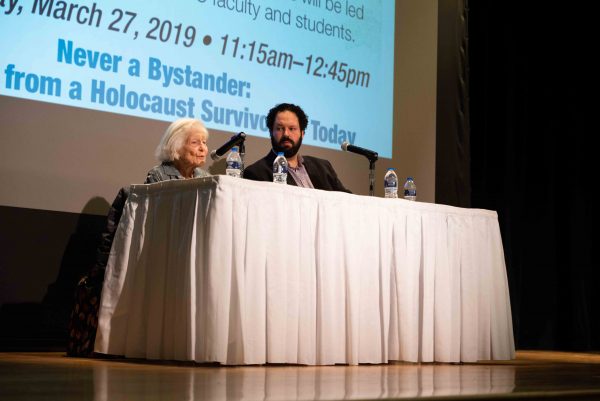

Holocaust survivor, Irene Hasenberg Butter, shares her story during the time when Nazis came into power in Germany. Lily Merritt | Washtenaw Voice
By Matthew Bartow
Contributor
WCC hosted Irene Hasenberg Butter, a Holocaust survivor, to speak at Towsley Auditorium on March 27, as part of WCC’s Global Discussion Series.
The event was called “Never a Bystander: Lessons from a Holocaust Survivor for Today,” inspired by the documentary “Never a Bystander,” of which she was the subject. Butter began her speech by explaining her interpretation of the phrase “Never a Bystander.”
“We all have a responsibility to act, to not be passive, to not be silent when events are immoral, inhumane and contradictory to the values of our American society,” Butter said.
Butter was born in 1930 in Berlin. She said she had a happy childhood for the first 6 years of her life.
Two years later, however, the Nazis invaded the Netherlands, and the family’s dream of becoming citizens were shattered. In 1943, they were deported to the concentration camp Westerbork, a transit camp in the Netherlands where many inmates were held before being sent off to death camps in eastern Europe.
Before they were deported, Butter’s family tried to obtain Ecuadorian passports, but they didn’t arrive until the family had already been deported to Westerbork. The passports were forwarded to the Westerbork camp. Butter said that this likely saved them from being transferred to a death camp.
“It meant a great deal to us because our status was transformed from just being Jews to becoming exchange Jews,” Butter said, referring to a policy of the German government where Jews with passports to foreign countries were reserved to be included in a prisoner exchange. “We suddenly had value to the Nazis, and we were no longer at risk of being deported to Auschwitz or another death camp.”
A few months later, Butter and her family were sent to an exchange camp in Germany where they would wait to be exchanged. They were told that the camp would be a better camp, one the Nazis called, a “privilege camp.”
However, this was not the case. Butter said that environment at Bergen-Belsen was horrible and unhygienic.
“The conditions were absolutely deplorable. For food, we were given a 3-inch piece of bread and a cup of turnip soup. It wasn’t enough for anyone to survive on for any length of time,” Butter said. “Plus, everyone was sick from epidemics of diseases transmitted from lice, including typhus, polio, pneumonia and dysentery.”
She said the most difficult aspect was learning to cope with death.
“Waking up in morning toward end of year meant being surrounded by dead bodies,” Butter said.
After being in Bergen-Belsen for almost a full year, her family was one of few selected to be part of a prisoner exchange. Butter said by then her parents were both extremely ill.
The family would board a train bound for Switzerland. On the second night of the train, Butter’s father passed away.
Upon arrival in Switzerland, Butter said that her mother and brother were immediately hospitalized; however, Butter was not admitted to the hospital because she was told she was not “ill enough.” She was sent to a refugee camp in Algiers in North Africa.
Butter said that for a few months while the war was still going on, she did not know if her mother and brother were alive.
After the war ended, she received a telegram that her mother and brother were recovering.
Although she desired to either return to Switzerland or for them to come to the camp in North Africa, neither were permitted.
Eventually, family in the United States agreed to sponsor them, but Butter said that the immigration process was slow and complicated.
“I came to the United States after one year in North Africa without family,” Butter said. “And my mother and brother didn’t come for six more months. Altogether, we were separated for 18 months before we could live as a family again.”
Butter said that even though the Holocaust happened many years ago, we still see examples of inhumane acts in today’s society.
“The Holocaust was a long time ago, but it’s not so far away from us. We see the echoes of the Holocaust reoccurring in our own country and around the world,” Butter said. “We see phenomena like ethnic cleansing, white supremacy, deportation, persecution, separating children from their families, and other inhumane acts that characterize the Holocaust.”
Rabbi Josh Whinston also spoke at the event about the current situation in Tornillo’s detention tent city in Texas, where migrant children are being held, and why it’s important we stand up in the face of inhumane acts.
“It is all of our jobs to be a better, compassionate country and make sure that our voices are heard,” Whinston said.
Meals were longtime tradition at monthly meetings Lily Cole | Editor The long-standing, but little-known…
Abigail Gibb | Contributor President Donald Trump has signed over 100 executive orders since the…
Beck Elandt | Staff Writer Photos by Courtney Prielipp While artificial intelligence can produce a…
Recent attacks against Diversity, Equity and Inclusion (DEI) initiatives from the Donald Trump administration have…
Sasha Hatinger | Staff Writer News is available to be consumed in a diverse selection…
This review may contain spoilers for “Mickey 17”, released in theatres on March 7, 2025. …